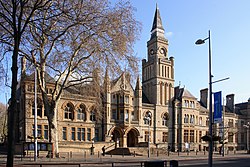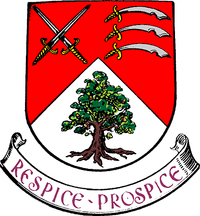History
A local board of health was formed for the southern part of the parish of Ealing, Middlesex, in 1863. In 1873 the board's area was extended to the rest of the parish. [1]
It was created an urban district in 1894, by the Local Government Act 1894. In 1901 it was granted a charter of incorporation to become the first municipal borough in Middlesex. The urban district council was replaced by a corporation consisting of a mayor, 6 aldermen and 18 councillors.
Ealing Town Hall was built in 1886, replacing an earlier hall on the same site. The architect was Charles Jones, who also designed several other buildings and features in the borough.
The borough was greatly enlarged in 1926 when it absorbed the urban districts of Greenford (including the parishes of Perivale and West Twyford) and Hanwell. [2] Accordingly, the size of the borough council was increased: by 1960 it consisted of a mayor, 16 aldermen and 48 councillors. [1] In 1952 there was a failed attempt to gain county borough status. [1]
In 1965, under the London Government Act 1963, the municipal borough was abolished and its former area transferred to Greater London to be combined with the Municipal Borough of Acton and Municipal Borough of Southall to form the present-day London Borough of Ealing. [3] An oak in its coat of arms features, smaller, in the coat of arms of the London Borough of Ealing.
This page is based on this
Wikipedia article Text is available under the
CC BY-SA 4.0 license; additional terms may apply.
Images, videos and audio are available under their respective licenses.



